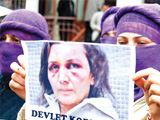|
|
TODAY.AZ / World news
Turkish government, president step up women abuse fight
20 July 2011 [12:00] - TODAY.AZ
 Increasing incidents of violence against women have prompted President Abdullah Gül to call for an extensive investigation of the issue as a government minister announces plans for the electronic monitoring of offenders.
Increasing incidents of violence against women have prompted President Abdullah Gül to call for an extensive investigation of the issue as a government minister announces plans for the electronic monitoring of offenders.The Presidency’s press office announced Tuesday that Gül had appointed the State Audit Board, or DDK, to extensively investigate cases of violence against women. The statement said the DDK had been ordered to investigate all aspects of the situation, “including the quality of legal, administrative and other services regarding the issue and the efficiency of such services.”
On the same day, Fatma Şahin, the head of the newly formed Family and Social Policies Ministry, announced that offenders who are under a restraining order will be monitored using electronic cuffs.
Şahin said she started working on domestic violence cases as soon as she was appointed to her post and that the ministry was specifically working on previous cases in which women were killed by their husbands and why the state failed to prevent the deaths.
The cases being analyzed by the ministry include the murder of Ayşe Paşalı, who was killed by her ex-husband in the middle of the street in December 2010. Paşalı had asked for state protection because she had been beaten and raped by her husband, but the court failed to make a ruling before she was killed.
“We are strengthening law enforcement regarding cases of violence against women,” Şahin said. “We are going to provide more authority to family courts. We will also set up an electronic follow-up system for men who are forbidden from seeing their wives [due to violent incidents]. Such systems are used in many European countries.”
Şahin, who is known for her work on the subject as the head of the ruling party’s women’s branch, also led Parliament’s Honor Killings Research Committee and its Equality of Opportunity for Men and Women Committee.
Women’s organizations responded positively to the news.
“We are very glad to hear the news,” said Vildan Yirmibeşoğlu, the director of the counseling desk of the Istanbul Governorship’s Human Rights Board. “A follow-up system is very important. Yet the state should also look into providing coordination between the police, prosecutors and the court.”
Yirmibeşoğlu, who also works as the general secretary of a women’s solidarity initiative, said there were gaps in the current laws that prevented such coordination.
“For example, in one of our cases the court prevented a man from seeing his wife. Yet he found her and threatened to kill her, so she called the police. Although the man repeated his threat in front of the police, the prosecutor didn’t arrest him because he didn’t have the court decision. That’s why coordination is very important,” Yirmibeşoğlu said.
She added that another important law-enforcement measure would be to allow the police to wiretap phone calls that include threatening messages.
“In many cases, women can prove that they are being threatened but there is no law to allow for the wiretapping of the suspect’s phone,” she said.
Women’s rights activist Nazlı Gürhan said that although the government had set up women’s shelters, many of their locations were known to the public.
“There are a lot of women who are afraid to stay in these houses because their relatives or husbands are waiting at the front door,” Gürhan said.
According to reports, 115 women were killed by their husbands or relatives in the first five months of 2011. The number was 217 in 2010 and 198 in 2009.
/Hurriyet Daily News/
URL: http://www.today.az/news/regions/90883.html
 Print version
Print version
Views: 1578
Connect with us. Get latest news and updates.
See Also
- 18 December 2025 [22:49]
Samsung creates energy-efficient server memory for AI data centers - 18 December 2025 [22:23]
Turkiye's First Lady highlights women’s role in peacebuilding and climate action - 18 December 2025 [21:22]
Finance Minister outlines tax relief measures for earthquake-affected regions - 18 December 2025 [20:46]
One in three in UK uses AI for emotional support - 18 December 2025 [19:45]
WBD in talks to sell TV unit - 18 December 2025 [19:19]
Hyundai to expand EV plug-and-charge network in Korea 2026 - 18 December 2025 [09:00]
OpenAI launch ChatGPT Images - 18 December 2025 [08:00]
US ban citizens from seven countries - 17 December 2025 [22:24]
Dubai introduces contactless hotel check-in - 17 December 2025 [21:50]
Sweden’s labor market recovery delayed until 2027
Most Popular
 Hornet's nest has been stirred up: how topic of Western Azerbaijan scared revanchists
Hornet's nest has been stirred up: how topic of Western Azerbaijan scared revanchists
 Huawei debuts new smartphones and devices in Argentina
Huawei debuts new smartphones and devices in Argentina
 Azerbaijan, Turkiye sign pact to strengthen military security
Azerbaijan, Turkiye sign pact to strengthen military security
 Russia open to consultations on TRIPP initiative with Armenia
Russia open to consultations on TRIPP initiative with Armenia
 Why Iran fears Corridor that Armenia sees as lifeline
Why Iran fears Corridor that Armenia sees as lifeline
 PM Asadov mulls regional co-op and North-South corridor with Astrakhan governor
PM Asadov mulls regional co-op and North-South corridor with Astrakhan governor
 President Ilham Aliyev addresses participants of 8th Congress of Azerbaijan Trade Unions Confederation
President Ilham Aliyev addresses participants of 8th Congress of Azerbaijan Trade Unions Confederation
